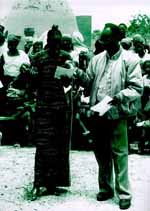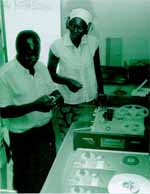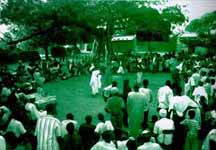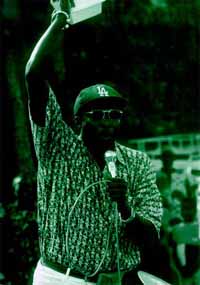 |  |
African rural societies increasingly find that they must adapt to a rapidly changing world. They have to integrate into complex worldwide economic mechanisms and yet not lose sight of the need to ensure their own food security. They must manage and protect their resources, improve their standards of living, health and education, and value and conserve their cultural heritage.
Communication is essential to overcome the constraints to development and face the challenges. Rural communities should have at their disposal the tools to access and convey useful information and knowledge. They should be able to exchange experiences, knowledge and techniques, and be actors in the debate on development matters.
In Africa, radio is the most widespread and popular tool of communication. Its versatility allows it to be at the same time:

Nevertheless, today most African rural radio stations are not in a position to fulfil this mission. There are many political, technical, legal, institutional and financial constraints which make it difficult for rural radio to adapt to change. These constraints are partly the result of the history of rural radio which for many years played a top down role, disseminating messages to rural communities.
However, some changes have taken place over the last ten years.
In most countries the general framework of the media is being redefined. Deregulation, the ending of state monopoly, the emergence of new actors and the appearance of important new technologies are all creating a context for new approaches to the development of rural radio:

This diversity of actors and initiatives presents a good asset for the development of rural radio because it is based on many different approaches, radio coverage over a wider geographical area, and better use of linguistic and socio-economic diversity. It also encourages closer and more interactive communication with village communities and empowers rural populations with a better use of this means of communication.
However, it can also present a danger: the initiatives to set up local radio stations are not properly coordinated and in consequence may be developed primarily in urban and peri-urban communities where there is a potential advertising market. Thus they are likely to be established principally for commercial, political or sectarian reasons to the detriment of public service broadcasting, which is the only way to guarantee to the rural populations an equitable access to information and to the media.
It is also important to emphasize that radio remains, and will no doubt continue to remain for some time, the communication media that is most readily available to serve the economic, social and cultural needs of rural Africans. It provides the one source of information, expression and communication at a time when new technology and global information and communication networks monopolize international attention, and siphon off a significant proportion of available resources.
It is therefore essential to ensure the survival and credibility of African rural radio. Assistance will be needed to lift some of the constraints to the infrastructure, equipment, the legal and institutional framework under which it is governed and to help rural radio to adapt to change. Radio stations will need to enhance their capacity to identify listeners' demands and respond to them. Training must be improved as well as the capacity to organize networks.
However, the necessary political, technical, legal, institutional and financial decisions upon which the successful transformation of rural radio will depend have not yet been taken. Rural radio is still too often dependent upon project funding and cannot sustain its activities when project funding ceases.
It is within this context, and at the request of several African states, that FAD, in collaboration with the Government of Burkina Faso and URTNA (Union des radios et televisions rationales d'Afrique) organized a workshop in Ouagadougou, 10-14 June 1996, which assessed the current status of rural radio in Africa, identified the principal constraints with which it is faced and established the broad principles of a plan of action for its development. Cooperation with international agencies in order to raise the funding necessary to implement the resulting plan of action was also discussed.
The workshop, which was one of a series of international meetings organized during preceding years by a number of international organizations, notably UNICEF, the Cultural and Technical Cooperation Agency (ACCT), the World Association for Community Radio Broadcasters (AMARC), the Agricultural and Rural Cooperation Centre (CTA) and the Panos Institute, was a significant opportunity for a meeting and exchange of views between all those engaged in the development of rural radio in Africa. The workshop brought together 73 participants including delegates from 21 francophone, anglophone and lusophone African countries, representatives of bi-lateral and multi-lateral organizations, working in partnership with African rural radio as well as representatives of many other public, private and other organizations, working in this sector. The workshop provided an opportunity for wide ranging, pertinent discussions and debate. It underlined the necessity in Africa for dynamic, lively, democratic and interactive rural radio.
It is now essential that, in order to move forward and open a route to the sustainable development of African rural radio, individual nations and their partners should define new directions for the legal and institutional frameworks and for technical infrastructure, equipment, research and training. They must also make a firm commitment to the realization of these objectives.
The workshop in Ouagadougou was an important step in this process because it led to the adoption of a declaration and a plan of action for the development of rural radio in Africa. The text of the declaration and plan of action follows.
African countries are finding themselves confronted by many significant changes, politically, economically and socially. These changes have been brought about by a process of democratization and pluralism, a desire for peace, decentralization of economic and political decision-making and the encouragement of the private sector to take over many functions previously undertaken by the state.
In this context, the major challenges to be met are: to improve agricultural production while preserving the natural resource base in order to meet the need for food security for a rapidly growing population; to improve standards of living, health, education and nutrition, particularly for women and children; to create income and employment opportunities; and to preserve cultural heritage.
These challenges will not be met without active popular participation of the population, for which communication is a strategic factor.

The Windhoek (1991) and Bamako (1993) declarations emphasized the necessity for developing independent and pluralistic radio and press.
Radio remains the most popular, viable, accessible and cost-effective means of communication for rural people. Radio can overcome the barriers of distance, illiteracy and language diversity better than any other media.
There have been a number of developments that have led to significant changes in the use of radio for reaching rural audiences. The introduction of new technology, the reduction in cost of FM transmitters and the replacement of state broadcasting monopolies by private sector and association-based radio has, in recent years, led to the development of new forms of radio both in urban centres and in rural communities.
This evolution has provided opportunities for a diversity of approaches to the use of radio, and much more effective coverage of audiences in terms of territory and meeting differing socio-economic and linguistic needs. From now on, all those who are involved in development, particularly those operating at the grassroots level, can make use of this form of communication, either by playing an active role in the conception and production of rural programmes for broadcast by existing radio stations or by establishing their own radio stations. Despite these promising trends, rural radio nevertheless suffers from initiatives that are too widely dispersed and from lack of resources.
Today rural radio is at a crossroads. Decisions must be made and a number of problems addressed in order to allow rural radio to develop in a coordinated manner so that it may fulfil its mission to provide information and opportunity for dialogue and contribute to rural development:
Finally, it is essential that all those involved in rural development (governments, international partners, NGOs, local groups and associations, the private sector, etc.) should support and encourage the development of rural radio in Africa. To achieve this it is necessary to identify all available means for establishing mechanisms for cooperation and follow-up which will allow the planning and mobilization, in a coordinated and complementary way, of all appropriate human, technical and financial resources. One such mechanism could be to find a linkage with the UN's Special Initiative for Africa.
We invite all partners in development to consider this Ouagadougou plan of action as a framework within which to define and implement actions for the development of rural radio in Africa.
